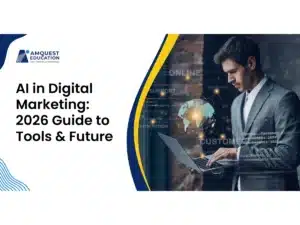In today’s fast-paced digital landscape, brands are no longer satisfied with simply reacting to customer behavior. The future of marketing lies in anticipation—predicting what customers will need before they even realize it themselves. Predictive content marketing is at the forefront of this shift, leveraging data-driven insights and AI-powered learning to forecast customer needs and deliver personalized, timely content. This strategic approach enables marketers to map customer journeys with precision, create future-ready campaigns, and build deeper connections with their audiences from the very first touchpoint.
In this article, we’ll explore how predictive content marketing works, its evolution, advanced tactics, and how Amquest Education’s Digital Marketing and Artificial Intelligence course equips marketers with the skills to excel in this dynamic field.
Background: The Evolution of Predictive Content Marketing
Content marketing has come a long way from its early days of static blog posts and newsletters. Traditional strategies were largely reactive, relying on past performance and intuition to guide content creation. But the rise of AI in marketing and sophisticated analytics has transformed this approach into a proactive, predictive model.
By 2025, marketing teams are increasingly relying on content forecasting to understand not just what customers want today, but what they will need tomorrow. Advances in machine learning, natural language processing, and real-time behavioral insights enable marketers to:
- Analyze vast datasets from CRM, social media, and web analytics
- Segment audiences with granular precision
- Predict future customer behaviors and preferences
- Automate personalized content delivery across channels
This evolution turns content marketing from a one-size-fits-all model into a dynamic, customer-centric process that maximizes ROI and builds lasting loyalty.
Latest Features, Tools, and Trends in Predictive Content Marketing
AI-Powered Analytics and Automation
Modern marketing automation platforms integrate AI to analyze customer data in real time, allowing marketers to tailor content dynamically. AI-driven content planners and personalization engines forecast topics that will resonate, optimize publishing schedules, and adjust messaging based on user interactions. This real-time adaptation ensures that campaigns are always relevant and engaging.
Behavioral Insights and Real-Time Adaptation
Predictive systems use behavioral triggers to detect when a customer is likely to abandon a cart or disengage, prompting timely personalized reminders or offers. This real-time adaptation enhances the customer journey by delivering the right content at the right time, increasing the likelihood of conversion and retention.
Multi-Channel Consistency and Integration
Predictive content marketing demands seamless integration across websites, apps, social media, and email to maintain consistent messaging and brand narrative. AI tools synchronize campaigns across these touchpoints, amplifying engagement and trust.
Video and Multimedia Content Forecasting
Short-form and interactive video continue to dominate engagement metrics. Predictive analytics help identify which video topics and formats will perform best, enabling brands to invest resources wisely and create content that drives action.
Advanced Tactics for Success in Predictive Content Marketing
Comprehensive Data Collection and Segmentation
Success begins with a robust data foundation. Marketers must aggregate data from multiple sources, including website analytics, CRM, social listening, and customer surveys. This comprehensive view supports precise audience segmentation, enabling personalized campaigns that speak directly to each group’s preferences and pain points.
AI-Led Content Planning and Creation
Leverage AI tools not only to generate content ideas but also to assist in drafting initial versions of content, optimizing it for search engines, and ensuring semantic relevance to user queries. This frees up human creativity to focus on storytelling and strategic messaging.
Continuous Testing and Optimization
Implement A/B testing and monitor KPIs such as engagement rates, conversion metrics, and customer lifetime value (CLV). Use predictive models to iterate campaigns swiftly, adapting to changing user behaviors and market trends.
Integrate Predictive Models with Marketing Automation
Deploy platforms that automate personalized content delivery based on predictive insights, ensuring campaigns are timely, relevant, and scalable. This reduces manual effort and increases marketing efficiency.
The Power of Storytelling and Community in Predictive Marketing
While data and AI drive prediction, the human element of storytelling remains vital. Predictive content marketing that incorporates authentic narratives and community engagement fosters emotional connections and brand loyalty. Understanding customer journeys through behavioral insights allows marketers to craft stories that anticipate and meet evolving needs, creating memorable experiences.
Measuring Success: Analytics and Insights
Effective predictive content marketing depends on rigorous measurement. Key performance indicators include:
- Forecast accuracy of content engagement and conversion
- Time-to-insight for campaign adjustments
- Lift in ROI from AI-guided actions
- Customer retention and lifetime value improvements
Advanced analytics platforms provide dashboards that visualize these metrics in real time, enabling marketers to make data-driven decisions and justify investments.
Business Case Study: Netflix’s Predictive Content Strategy
Netflix’s journey from a DVD rental service to a global streaming giant is a testament to the power of predictive content marketing. Facing fierce competition and diverse viewer preferences, Netflix leveraged AI-powered analytics to analyze viewing habits, search queries, and social media trends. Predictive models were used to greenlight original series and tailor recommendations at the individual level.
The results speak for themselves: over 230 million subscribers globally and a 74% retention rate, demonstrating the impact of predictive marketing on engagement and revenue.
Why Choose Amquest Education’s Digital Marketing and Artificial Intelligence Course?
Amquest Education in Mumbai offers a comprehensive course that prepares marketers for the future of predictive content marketing. The program blends AI-led modules with hands-on learning, ensuring students gain practical experience and industry-relevant skills.
Key features include:
- Deep integration of AI tools and real-world applications
- Experienced faculty with industry expertise
- Partnerships with top companies for internship opportunities
- Flexible learning options, including online availability
- Strong placement support with measurable career outcomes
Amquest’s course empowers students to master data-driven content strategy, personalized campaigns, and marketing automation tools essential for predictive content marketing success.
Actionable Tips for Marketers Implementing Predictive Content Marketing
- Invest in Data Quality: Ensure your customer data is clean, comprehensive, and integrated across platforms.
- Prioritize Audience Segmentation: Use predictive insights to create detailed personas and tailor content accordingly.
- Leverage AI Tools: Automate content ideation, creation, and distribution while maintaining human creativity in storytelling.
- Test and Optimize Continuously: Use A/B testing and predictive analytics to refine campaigns based on real-time feedback.
- Align Multi-Channel Campaigns: Maintain consistent messaging and personalized content across all customer touchpoints.
- Measure with Clear KPIs: Track forecast accuracy, engagement, conversion, and ROI to demonstrate impact.
Conclusion
Predictive content marketing is no longer a futuristic concept but an essential strategy for brands aiming to anticipate and fulfill customer needs proactively. By combining AI-powered analytics, behavioral insights, and marketing automation, marketers can craft personalized campaigns that engage audiences deeply and drive measurable business outcomes.
For professionals eager to lead in this evolving landscape, Amquest Education’s Digital Marketing and Artificial Intelligence course offers unparalleled training, industry connections, and practical experience to master predictive content marketing and thrive in 2025 and beyond. Explore how this course can transform your career and marketing strategies by visiting Amquest Education’s course page today.
FAQs
Q1: What is predictive content marketing?
Predictive content marketing uses AI and data analytics to forecast customer needs and behaviors, enabling the creation of personalized, timely content that anticipates audience interests before they arise.
Q2: How does content forecasting improve marketing campaigns?
Content forecasting helps marketers identify trending topics and customer preferences early, allowing them to tailor content and allocate resources effectively to maximize engagement and conversions.
Q3: What role does AI play in predictive content marketing?
AI processes vast amounts of data to uncover patterns, predict behaviors, and automate content creation and distribution, making campaigns more efficient and personalized.
Q4: How can marketers use data-driven content strategy?
By collecting and analyzing customer data, marketers segment audiences precisely and develop content that addresses specific needs, increasing relevance and campaign success.
Q5: What is marketing automation in predictive content marketing?
Marketing automation uses software to deliver personalized content and offers automatically based on predictive insights about user behavior, improving engagement and operational efficiency.
Q6: How can I measure the success of predictive content marketing?
Key metrics include forecast accuracy, engagement rates, conversion rates, customer lifetime value, and ROI from AI-guided campaigns.






